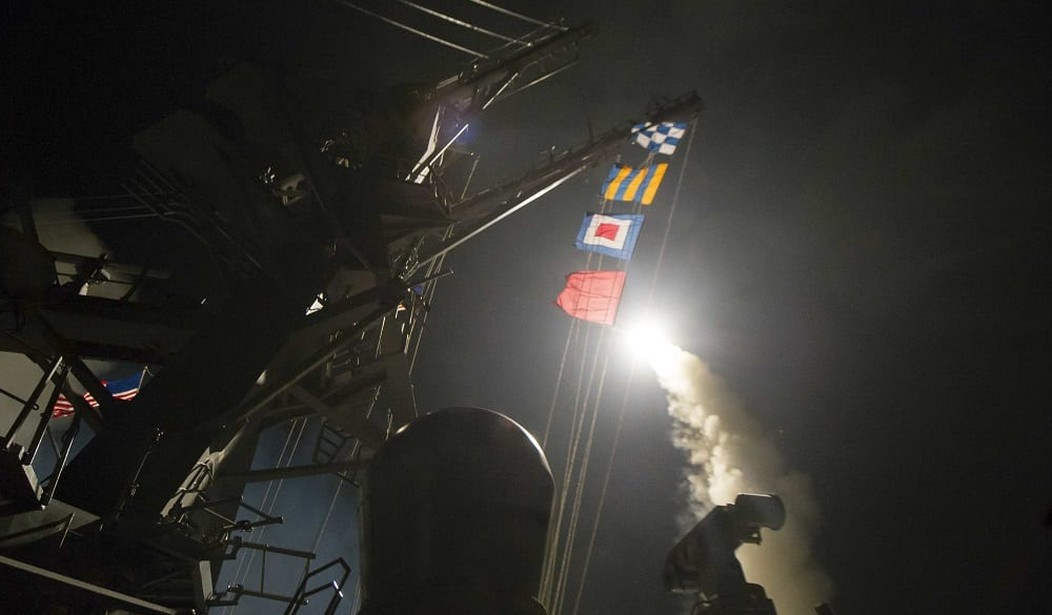Horror from the most recent chemical weapons attack in Syria will stay with us for a long time.
Innocent men, women, and children were used as pawns and went through agonizing deaths, foaming at the mouth, convulsing, and choking for breath. Though the atrocities always seem so far away from our American shores, we as fellow humans ache for the victims and the loved ones they left behind.
But we should not have attacked Syria.
I am no warhawk, but like many, I understand when American military action is necessary and will bring long term benefits. “War is hell”, and decisions to head near that destination should not be taken lightly. Admittedly, it feels good to throw an unexpected punch and leave your dazed enemy on the ground. But they will get up. What is our plan then for dealing with this specific aggression in an already tumultuous corner of the world?
Daniel Pipes, foreign policy analyst, in a Friday piece at National Review, emphasis mine:
The direct American involvement that began late Thursday night with nearly 60 cruise missiles attacking Shayrat Air Base implies siding with one side against the other, even though both of them are hideously repugnant. (While the regime has done the great preponderance of the killing, estimated at 94 percent, that’s due only to its greater destructive power, not the humanitarianism of its ISIS and its other enemies.)
I see this military action as an error. Nothing in the U.S. Constitution requires that American forces fight in every war around the world; this one should be sat out, letting enemies of the United States fight each other to exhaustion.
The immense resources of the United States should be dedicated, rather, to two goals: reduce human suffering with humanitarian aid and prevent the stronger side (now the regime) from winning through the provision of intelligence and arms to the weaker side (the Sunni rebels). Trump should immediately cease all direct attacks on the Syrian regime and instead help its enemies to fight it more effectively.
In August 2012, then President Obama issued the well-known “red line warning”, telling Assad that use of chemical weapons would result in military intervention. One year later in August 2013, chemical weapons were used on civilians in the Damascus region killing approximately 1,429 people. As we know, nothing was done. Now with President Trump at the helm, addressing the latest atrocity became a priority. It’s disconcerting, though, that his views of the murderous regime and its leader changed only after the most recent attack. Either he had not been paying attention, or those surrounding him have been doing a poor job of explaining international realities.
Though Senator Rand Paul and others say that President Trump should have waited for congressional approval, Senate Majority Leader Mitch McConnell says such a thing was unnecessary. McConnell expressed his thoughts about what he believed to be image-making, preliminary actions, as Politico reports.
“I don’t know that it necessarily settles things in Syria, but it’s a huge message to countries like North Korea and Iran and Russia that the era of American passivity is over,” McConnell said, accepting Hewitt’s comparison of Trump’s airstrike to President Ronald Reagan’s 1986 bombing of Libya. “I think it was a very, very important step and, as you suggest, maybe akin to what Reagan did to Gaddafi back in ’86. And I think it was an image maker for the president but also very much the right thing to do.”
A very real concern is that there’s no next step in place to follow these airstrikes. As Eli Lake over at Bloomberg writes, the Trump administration has to offer more than “cruise missile diplomacy”.
The fact that Trump responded so quickly to President Bashar al-Assad’s latest atrocity is a good first step in restoring deterrence. But it will take more than cruise missile diplomacy to restore the international order that has been collapsing in the Obama years. Trump should plan for something bigger.
At this point, it would be good for Trump to press his national security team for a plan to destroy Assad’s Air Force entirely. He uses his aircraft to drop chlorine bombs and sarin, like he did this week, and he has dropped barrel bombs that have destroyed so much of his country since 2011. The world will be a better place with these weapons destroyed.
I applaud challenging evil and using force to stop murderous thugs who are unconcerned with following established guidelines. However, initial actions must be part of a larger plan which leans heavily on equipping those on the ground to bring about their own change. “Cruise missile diplomacy” makes a big statement, but often accomplishes so little. There’s nothing wrong with a desire to create an image meant to contradict your predecessor, but this in itself is not essential.
Those outside the conflicted areas barely remember the 1400+ lives brutally taken in August 2013, but their lives mattered just as much as the ones snuffed out this week. Foreign policy has to be more substantial than red line warnings from a weak president or primetime displays of power from an eager newcomer.
If not, it’s better that none of these actions happen at all.














Join the conversation as a VIP Member